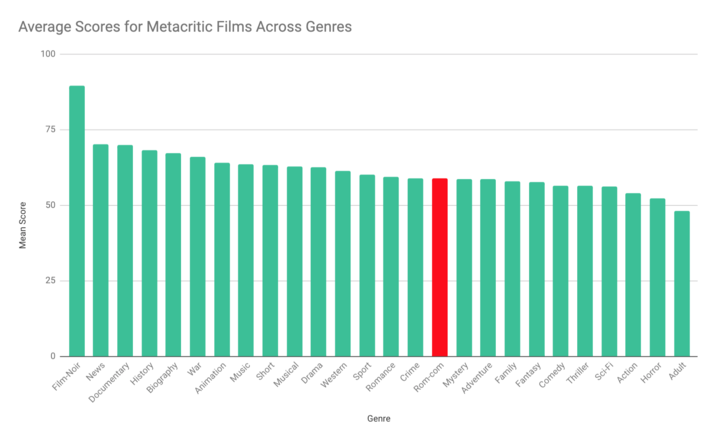[ad_1]
It’s all about hate… actually. Welcome To HuffPost’s Rom-Com Week.
The critic who hates rom-coms hated “Amelie,” which his colleagues uniformly loved. He thought it was “so sweet it might make you ill.” He loathed “Wimbledon,” which his colleagues mostly liked. He called it “the cinematic equivalent of a careless foot fault.” He liked “Knocked Up,” sure, just not as much as everyone else. “The story line meanders and too many scenes drone on.”
By our calculations no critic hates romantic comedies more than — well, take a look at the table at the bottom of the page, where you can also find the critic who loves rom-coms more than his peers.
Before we get to that, though, a few words about our methodology: Our data was culled from the review aggregator Metacritic. We downloaded as much movie review data as we could get our hands on — which turned out to be 211,914 reviews of 11,124 films. Then, for each film, we worked out its average score based on all of the critic reviews, which Metacritic normalizes on a 1-100 scale (so 5 stars is 100/100, 4 stars is 80/100 and so on).
We then totaled up the average score for each of the genres Metacritics splits movies into. But there was a problem: Metacritic has a “romance” category and a “comedy” category, but no “romantic comedy” category. We could simply look for films that are listed in both, but that doesn’t feel quite right: For instance, “Deadpool” is technically in both categories, but that isn’t anyone’s idea of a rom-com. So instead we assembled a canonical list of rom-coms more or less by hand, around 300 films in all.
There are few questions we can start to answer with this data set. For starters, do critics hate rom-coms as a genre? Our numbers say not really:

James O’Malley
The rom-coms on our canonical list have an average score of 59.321, compared with 53.926 for action films and 56.421 for comedies, the other two pillars of mainstream cinema. Where rom-coms suffer is in comparison to the serious genres, such as dramas, which score 62.5, and documentaries, which have a rather nice 69.977. (The slightly more extreme scores for film noir and adult on both ends of the spectrum shouldn’t be considered too indicative, as Metacritic has only 13 and eight films tagged in each genre, respectively.)
Now for the reviewers: Are there critics out there who are particularly anti-rom-com?
To figure this out, we went through each review we had downloaded and worked out the “distance” in score between that individual review and the film’s average. If a film averaged 80/100, but that individual critic gave the film 60/100, it would have a “distance” of -20. Using this, we then totaled up the average “distance” for each critic across all of their reviews. Call it a generosity rating.
Still following? Great. Because now we have a data set working out which critics are more or less generous than average, for all movies. Picking a random example from the table below (spoiler alert!), A.O. Scott, who reviews movies for The New York Times, on average rates films 1 point higher on the normalized 1-100 scale than the average of all of his colleagues, and Peter Travers, who writes blurb-friendly reviews for Rolling Stone, is a slightly harsher critic, rating films on average 1.69 points lower than the average of all of his colleagues.
But what we want to know about is what critics think of rom-coms. What we needed to do was also work out each critic’s generosity rating for rom-coms specifically.
To do this, we took our list of around 300 HuffPost-chosen rom-coms again. We then calculated a generosity rating for each critic based on their reviews from just this pool of rom-coms.
So now we know each critic’s average distance for all reviews, and for this pool of rom-coms specifically. Working out who hates rom-coms the most and who likes them the most is simply a case of taking one average away from the other.
Check out the table below for results. It’s filtered to critics who have reviewed at least 50 of the films on our rom-com list — the higher up on the table they are, the more they love rom-coms relative to other films; the lower down, the more they hate them.
According to our model, The Baltimore Sun’s Chris Kaltenbach is the “Amelie”-hating rom-com grouch. And David Sterritt, The Christian Science Monitor’s critic from 1968 until 2005, is the rom-com lover. Notably, he judged “Alex & Emma” to be “diverting fun” while most of his colleagues wished the film had been diverted into the sun.
What does all of this mean? Who knows. But let’s face it, whatever the critics say, you’re going to watch “Love Actually” again this Christmas anyway.
[ad_2]
Source link

